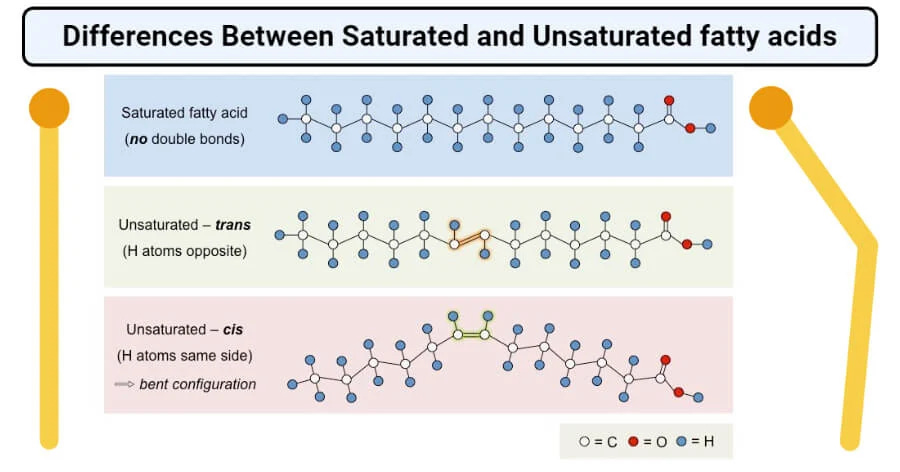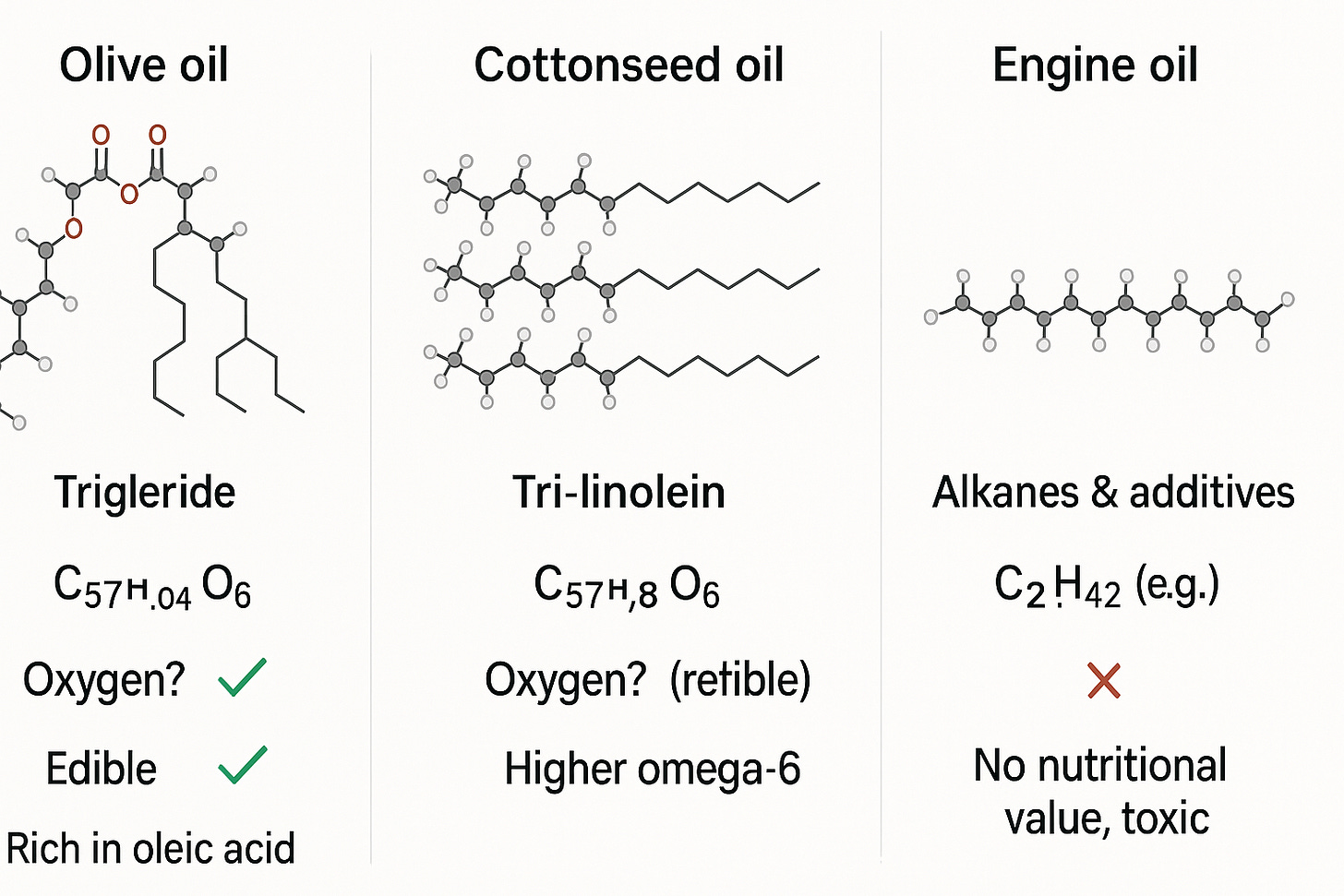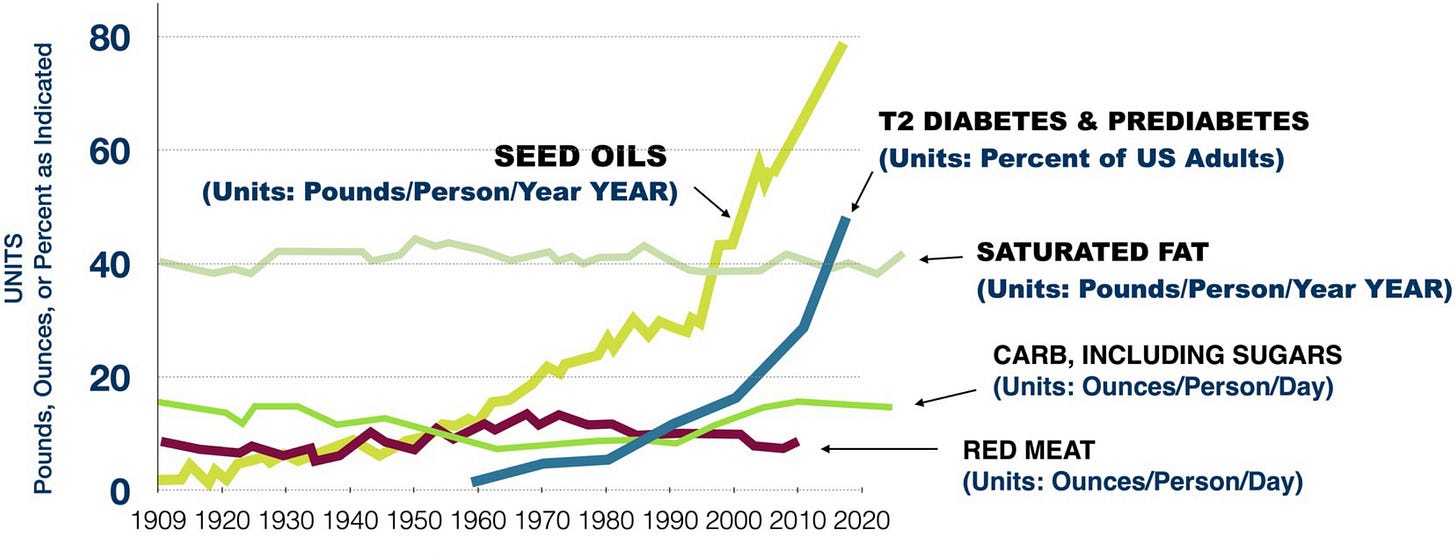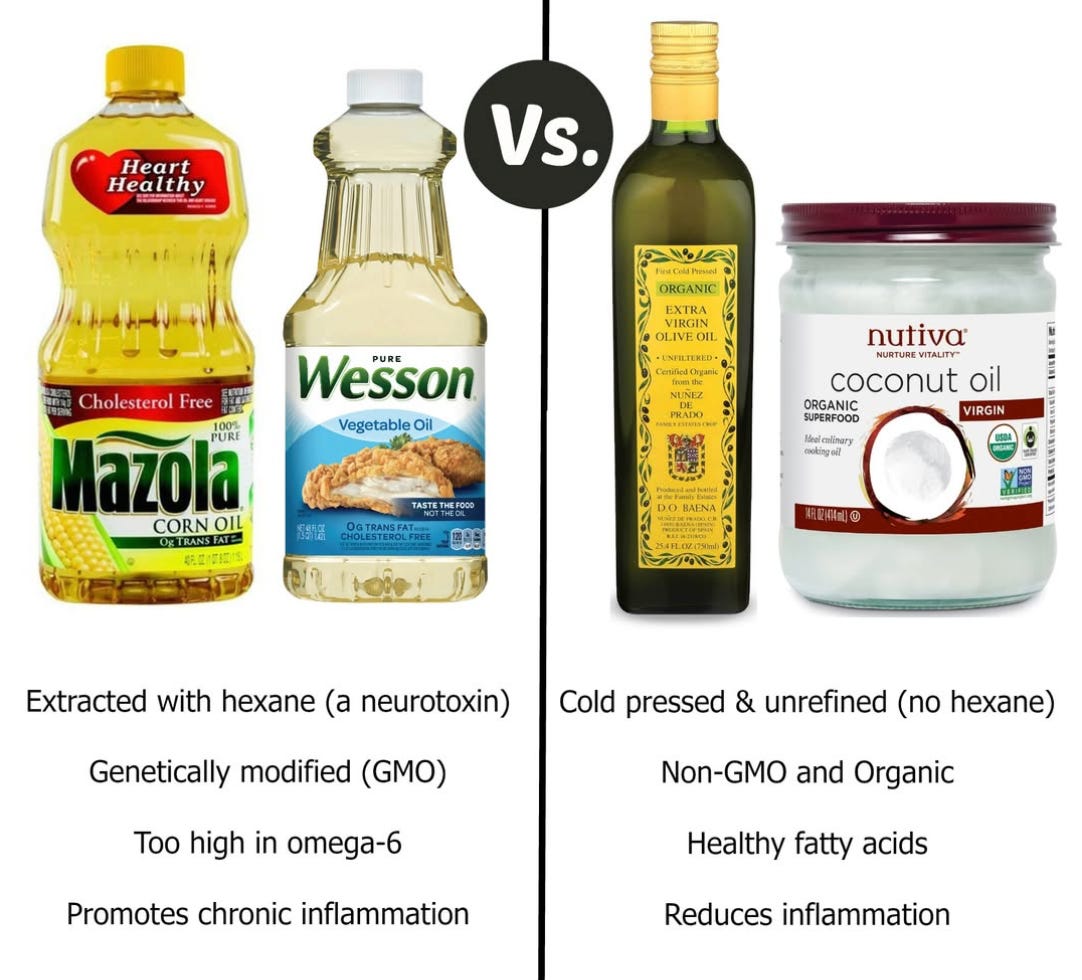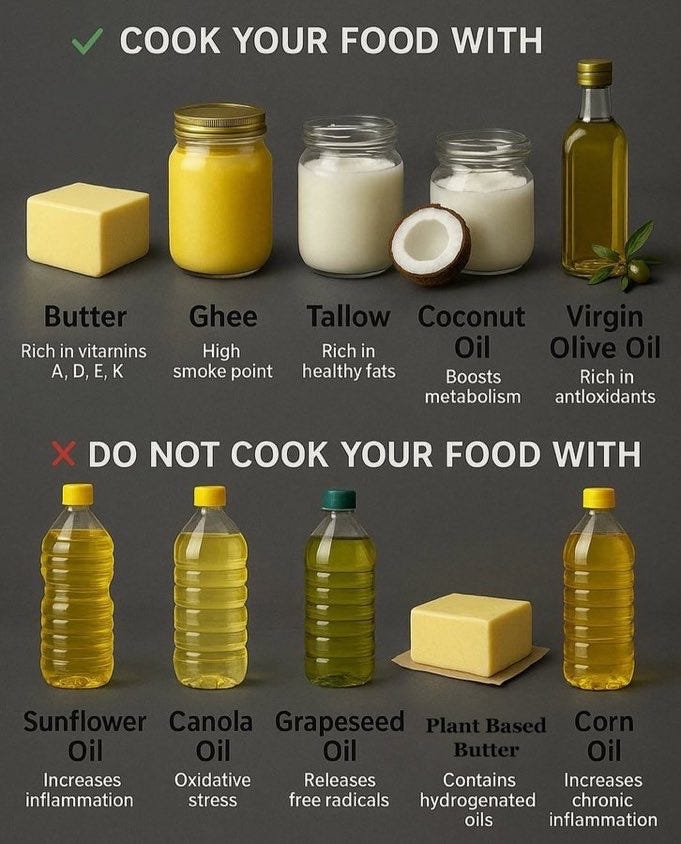Why can't you drink engine oil?
The answer is more complicated than you might think and has bothered me for years
Before we get into the chemistry, it’s worth mentioning that oils and fats are essential for the function of a healthy human. But during the 80’s and all the way into the 2,000’s there was a huge marketing war on all fat: “low fat yogurt”, “don’t eat butter” etc. Every food product that came out for a long time had a low-fat version. People were encouraged to try and cut fat out of their diets.
If you look at how lean a typical Kenyan Kalahari bushman is who only eats meat and fat, and compare how fat a typical American is who mainly eats refined carbs - the answer should be pretty obvious
“Fat doesn’t make you fat, carbs make you fat”
- Dr Robert Atkins
Most people now realise the truth that that good fat isn’t the enemy and that the bigger problem used to be refined carbohydrates - often loaded into “low fat” options like yogurt.
The false “war on fat" was largely started by the sugar industry in the 1960s by funding research that downplayed the risks of sugar and instead shifted blame to saturated fats, according to NPR. This was done to protect their products from accusations of contributing to heart disease. See also this article from the times
As another lawyer of nuance however, there are most definitely good fats and bad fats, as we’ll explore below.
Hydrocarbon chemisty
Oils and fats are basically just long chains of carbon atoms and hydrogen atoms. The longer the “chain” of carbons and hydrogens, the more likely it is to be solid at room temperature.
If all of the bonds between carbon atoms are “filled up”, the fat is said to be “saturated”, if there are still some double carbon-carbon bonds left over , then the fat is said to be “unsaturated”.
Solid artificial fats like margarine are made by artificially “hydrogenated” unsaturated fats, and pumping the molecule full of hydrogen, making it dense, and more likely to be solid at room temperature. Unfortunately, artificially hydrogenated fats like margarine are not chemically equivalent to butter or coconut oil.
Recent large-scale studies (e.g., PURE study, BMJ meta-analyses) found no strong link between healthy saturated fat intake (like butter) and heart disease in general populations. But Margarine would be classed as an unhealthy saturated fat.
Having tried to figure out WHY some oils and fats are healthy and some aren’t on many occasions, I can assure you that it’s an infuriating study topic, as some things that are good for you look VERY VERY similar at a molecular level to some things that are bad for you.
The difference between edible oils and non-edible oils, largely just comes down to the fact that edible oils have an oxygen atom or group on the end of the molecule, whereas pure petroleum doesn't. (pure petroleum is just carbon and hydrogen atoms)
After spending too much time trying to figure out why our bodies can digest hydrocarbons with an OH on the end, but they can’t without, I’ve decided that the answer requires a PHD in biology and chemistry.
But… all you need to remember is that although all three molecules in the diagram above are carbon and hydrogen based, have similar chemical formulas, and similar shapes, just the presence of oxygen and the specific molecular structure can determine whether something is digestible, useful, toxic or even deadly to the human body.
An example is hemlock vs. parsley. Both look incredibly similar — both are leafy green herbs in the same plant family (Apiaceae), but hemlock is a deadly poison, and parsley is a pleasant garnish.
Liquid oils vs solid fats
A decade ago, I informed one of my close friends that the relative health benefits of various fats was likely closely related to their viscosity at room temperature (so I believed at the time).
I had come to this conclusion based on my: knowledge of high school chemistry, combined with information I’d subsequently read about nutrition, and propaganda from the sugar industry.
The sugar industry told everyone that butter was bad, and I had incorrectly deduced that the reason WHY it must be bad likely came down to the fact if a fat is solid at room temperature (like butter or coconut oil), then surely it’s more likely to clog up your arteries and cause heart disease right?
As a result, my friend got rid of their butter, and coconut oil, and replaced it with other oils including seed oils - which is not actually a recipe for good health.
It turns out that natural solid fats like coconut oil and butter can be good for you, while liquid seed oils can be very very bad for you.
The worst offender, Cottonseed oil
During WW2, cotton seed oil was use as an engine lubricant and bio-diesel replacement, it was not generally considered safe for human consumption. Although cotton seed oil comes from a plant, it’s not a plant with the same nutritional value like an olive tree or coconut tree.
If you look at the rise of chronic disease and obesity in America, it pretty well lines up with the increase in seed oil consumption. Seed oils now make up 20% of the calories a typical American consumes. Nowadays, at least 6 in 10 Americans suffer from chronic illness — a 700% increase since the first survey on the topic in 1935.
The article I got this graph from, makes very strong case linking seed oils to the American obesity, cancer, diabetes and general help epidemic
Since WW2, industrial methods of mass production shifted the world towards cheap, unfamiliar sources of fats and oils.
As margarine and vegetable oils became increasingly popular, their purported health benefits were aggressively marketed despite being based on little to no scientific evidence.
Producers sought innovative ways to reduce the cost of producing goods, leading to the invention of Crisco, a solid fat made from cottonseed oil.
What is Cottonseed Oil?
It’s a vegetable oil extracted from the seeds of the cotton plant.
Used in many processed foods: snacks, baked goods, fast food frying, etc.
Often refined, bleached, and deodorized (RBD) to make it edible.
Cottonseed oil is extremely high in polyunsaturated fats, especially omega-6s.
A modern diet with too many omega-6s (and too few omega-3s) can lead to chronic inflammation — linked to heart disease, obesity, etc
Uses hexane (a petroleum solvent and neurotoxin) during extraction.
May be treated with high heat, which creates trans fats and oxidized compounds — both harmful and cancer causing.
Cotton isn’t classified as a “food crop” in many countries.
It may be heavily sprayed with industrial pesticides not approved for edible plants — and some residues can remain in the oil.
Contains gossypol, a natural toxin in cotton plants to deter insects.
Can be toxic to humans and animals in large doses (interferes with fertility and digestion).
Proper refining removes most gossypol — but crude/unrefined cottonseed oil is unsafe, and not all manufactures take much care.
Summary
Although all oils and fats are just long chains of carbon and hydrogen atoms, molecules that are very chemically similar can vary widely in what they actually for your body.
Olive oil is healthy, Cottonseed oil and Margarine are inflammatory, and Petroleum is deadly.
Whether something is solid or liquid at room temperate does not determine how healthy it is for you. Butter is better for you than cotton seed oil.
Industrial processes have turned previously inedible oils into supposedly edible oils. Crisco, Cotton Seed oil, Margarine are all man-made Franken-foods, and it’s probably best to stay away from them.
Obesity and sickness (especially in the USA) has closely mirrored seed oil and carbohydrate update. As Americans have eaten less meat and butter they have gotten sicker and sicker.



